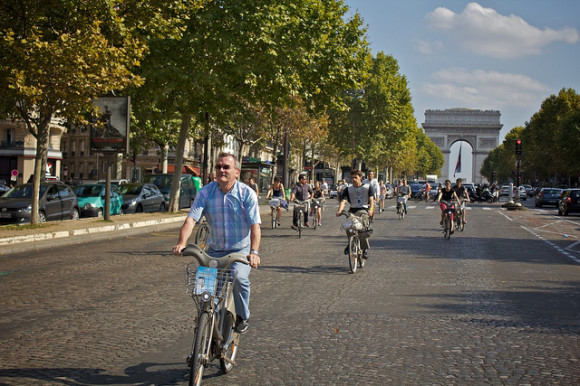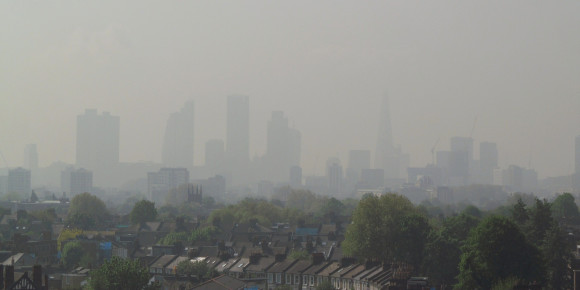
Cities love and protect their citizens, how about the Member States and the Commission?
 All of Europe is applauding the Mayor of Paris, Mrs Anne Hidalgo, for her courage in banning diesel cars from the city by 2020 as a means of reducing air pollution.[1] It seems that cities are taking the lead in protecting their citizens' health against air pollution, but that Member States and Europe might be falling behind. ECF, together with our members and numerous other NGO’s, strongly recommend to value these local initiatives and support them by taking serious actions and owning up to responsibility on the national and EU level. Road transport is indeed a major source of air pollution as it accounts for 40% of NOx emissions in urban areas[2]. The Euro standards system of vehicle emissions limits, intended to tackle urban air pollution, is not delivering the expected results: real-world NOx emissions from diesel cars are three to five times higher than official test results suggest.[3] Cities are starting to realize that a more reliable solution to securing citizens' health and well-being is to ban polluting vehicles from the city and push private car drivers towards a modal shift to less polluting transport modes, such as clean public transport, walking and cycling. Paris made a step in the right direction and deserves a round of applause. Fortunately, Paris is not the only city in Europe tackling the air pollution problem in this manner. Berlin, Rotterdam, Gent and Sevilla, to name a few, have been working successfully to diminish the number of cars in the city, reduce air pollution and prioritise healthy transport habits for their citizens. Brussels, London and Antwerp are now starting to think along the same lines.
All of Europe is applauding the Mayor of Paris, Mrs Anne Hidalgo, for her courage in banning diesel cars from the city by 2020 as a means of reducing air pollution.[1] It seems that cities are taking the lead in protecting their citizens' health against air pollution, but that Member States and Europe might be falling behind. ECF, together with our members and numerous other NGO’s, strongly recommend to value these local initiatives and support them by taking serious actions and owning up to responsibility on the national and EU level. Road transport is indeed a major source of air pollution as it accounts for 40% of NOx emissions in urban areas[2]. The Euro standards system of vehicle emissions limits, intended to tackle urban air pollution, is not delivering the expected results: real-world NOx emissions from diesel cars are three to five times higher than official test results suggest.[3] Cities are starting to realize that a more reliable solution to securing citizens' health and well-being is to ban polluting vehicles from the city and push private car drivers towards a modal shift to less polluting transport modes, such as clean public transport, walking and cycling. Paris made a step in the right direction and deserves a round of applause. Fortunately, Paris is not the only city in Europe tackling the air pollution problem in this manner. Berlin, Rotterdam, Gent and Sevilla, to name a few, have been working successfully to diminish the number of cars in the city, reduce air pollution and prioritise healthy transport habits for their citizens. Brussels, London and Antwerp are now starting to think along the same lines.
Clean Air Policy Package is at risk But what about Member State and European support in the fight against air pollution? Air pollution costs Europe between €330 and €940 billion and causes over 400,000 premature deaths every year[4]. Despite these alarming facts, the actions on national and European level are not so progressive. The Juncker Commission is reviewing the priorities for the 2015 Commission Work Program and is threatening to withdraw the Clean Air Policy Package in order to boost the economy in the short-term. The Clean Air Policy Package was established in December 2013 and set to be reviewed in 2015 with new air quality objectives for the period up to 2030 and stricter national emission ceilings for 6 main pollutants. Besides the Clean Air Policy Package, the Commission should also improve the Euro standard testing system, a seemingly small but not negligible measure. As for the Member States, most of them have come up with plans to meet the current EU limit values for air pollution, but these plans are often too weak and too slow. The current UK plan would reduce air pollution only by 2030. The UK Government received a warning (19 October 2014) from the European Court of Justice (ECJ) that the UK is in breach of EU law and should have created plans to tackle air pollution in the overly polluted areas by January 1, 2015, at the latest.[5] Thanks to this case brought forward by NGO ClientEarth[6], the British courts can now enforce the government to come up with a more serious plan that meets limit values in a shorter timeframe. This shows that NGO’s and cities can play a major role in saving citizens from premature death caused by air pollution, as has been demonstrated by ClientEarth and the city of Paris. ECF, together with our members and numerous other NGO’s, are urging Member States and the European Union to set more ambitious targets and take fast-tracked measures in order to deliver the clean air all European citizens need. The European Commission and the Member States should take responsibility to combat air pollution and support local initiatives more actively.
Network/Project Involved:
- Log in to post comments
Contact the author
Recent news!
Upcoming events
Contact Us
Avenue des Arts, 7-8
Postal address: Rue de la Charité, 22
1210 Brussels, Belgium









